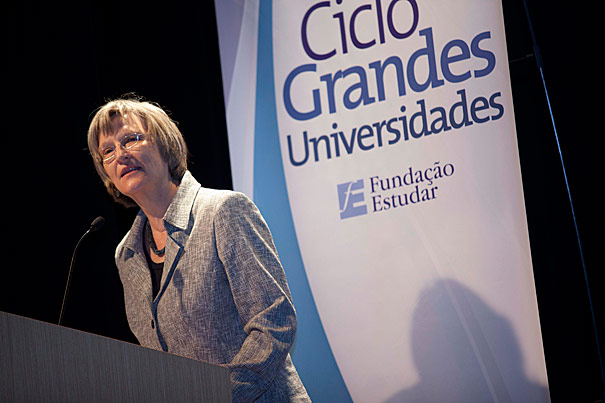
“Harvard is proud to be associated not only with Estudar and its founders but also with the many outstanding students whose education has been made possible by Estudar’s support,” said President Drew Faust during a March 23 symposium in São Paulo, Brazil. Photo by Kris Snibbe/Harvard Staff Photographer
Photos by Kris Snibbe/Harvard Staff Photographer
Spotlight on Harvard in Brazil
President Faust’s visit draws attention to University’s ties to key South American nation
President Drew Faust is traveling this week to highlight Harvard’s engagement with Latin America. In Brazil, she is reconnecting with alumni, exchanging ideas with the leaders of local universities, and meeting with Brazilian students who have studied alongside Harvard students or with Harvard faculty in Brazil. Below, faculty members and others involved in the trip share their impressions about key stops along the way.
Investing in universities
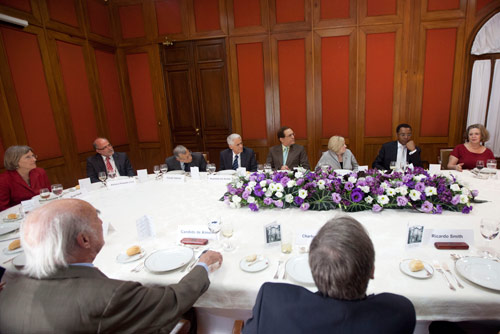
As countries become more successful economically, they must look to their institutions of higher education to prepare the skilled professional and technical labor force that is needed for growth and good governance. Governments, the philanthropic sector, and the private sector are thus increasingly cognizant of the need to invest in an expanding university sector. At the same time, countries facing this challenge in higher education become acutely aware of deficiencies in their primary and secondary education systems.
This was one of the dilemmas that President Drew Faust heard about over lunch with presidents and deans of several of Brazil’s top universities. As their institutions expand, they told her, it becomes increasingly difficult to ensure the quality of students admitted because so many of them suffer from poor preparation. Thus, improving higher education means paying more attention to primary and secondary schools, and investing more in them.
Yet Brazil can also be very proud of its graduate-level training, which annually far exceeds other countries in the number of master’s and Ph.D. degrees awarded. Equally important, these degrees are concentrated in areas in high demand in a rapidly growing economy — engineering, science, medicine, and technology.
The university leaders agreed that an important step forward would be improving the quality of education for the country’s teaching profession, as well as raising salaries for those who choose a career in education. In this way, the university sector could help resolve one of the constraints it faces in its own development.
— Merilee Grindle, Edward S. Mason Professor of International Development at the Harvard Kennedy School; Director of the David Rockefeller Center for Latin American Studies
Room with a view
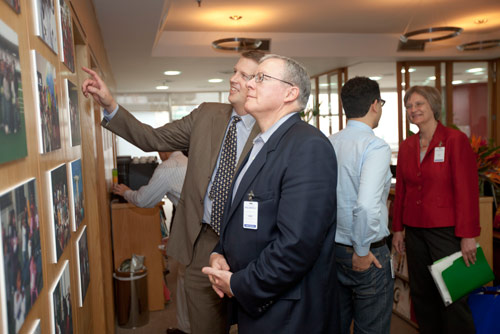
From the 17th floor of Harvard’s David Rockefeller Center for Latin American Studies’ Brazil Office on Avenida Paulista, President Drew Faust looked beyond nearby helicopter pads to the center of São Paulo and the Guarulhos International Airport, where she had arrived two days before. The clear day allowed her to take in the Serra da Cantareira mountains to the north, the green oasis of the University of São Paulo’s campus to the west, the Museum of Art of São Paulo across the street, and the sea of buildings that define South America’s largest city. Moments before Faust’s arrival, Jaissa Feliz ’12 dashed off to a 9 a.m. class at the nearby Fundação Getulio Vargas (FGV) after speaking with Harvard Vice Provost for International Affairs Jorge Domínguez.
Before sitting down at a conference table made of three kinds of (certified) Brazilian wood for a conversation with Harvard’s Brazil-based team, Faust took a few minutes to carefully study photos of the more than 450 Harvard students and dozens of faculty who have engaged in Brazil since the opening of the office in mid-2006. A group shot of the first Harvard-Brazil Symposium in 2007, including the now familiar faces of Jorge Paulo Lemann ’61 and DRCLAS Director Merilee Grindle caught her eye. Meanwhile, James Rothenberg ’68, M.B.A. ’70, Harvard’s treasurer, stopped in front of a picture of a young boy taken during a January 2010 Collaborative Public Health Field Course in Bahia. The boy was using a wooden pole and bucket designed by students to fish his soccer ball out of a snail-infested river without running the risk of contracting schitosomiais.
Faust then spoke with Brazil Office staff and a Lemann Fellow about opportunities to further increase Harvard’s engagement in and with the country. As the group prepared to leave for a 10 a.m. meeting with Brazilian students who had participated in the Engineering and the Urban Environment field course, public health field course, and air pollution research at Harvard, one member of Faust’s delegation stopped for a final espresso. As dark coffee dripped into a tiny cup (by Dunkin’ Donuts standards), she noticed David Rockefeller looking at her from a photo of his November 2007 Brazil Office visit.
— Jason Dyett, Program Director, Brazil Office, David Rockefeller Center for Latin American Studies, Harvard University
Working together
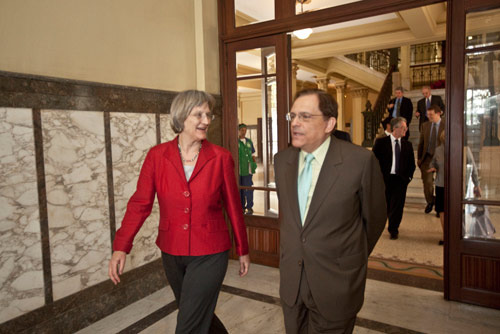
President Drew Faust’s visit to Brazil engaged her in working discussions with the presidents of Brazil’s leading universities as well as many academics and other professionals. Many are members of the advisory board of the Brazil office of Harvard’s David Rockefeller Center for Latin American Studies (DRCLAS). The advisory board is chaired by Claudio Haddad, a 1987 Harvard Business School graduate in the Owner/President Management Program and president of INSPER, a leading business school in São Paulo.
President Faust had a long conversation with João Grandino Rodas, LL.M. ’78, president of the University of São Paulo (USP), which is the large and distinguished Brazilian university with which Harvard has the most intense academic relationships. Harvard’s School of Engineering and Applied Sciences has jointly sponsored for two consecutive years a January course with the USP’s Escola Politécnica; one course was on water, the other on the urban environment. Similarly, the Harvard School of Public Health (HSPH), the USP, and other Brazilian institutions have sponsored yet another course in January on public health issues. In each of these January courses, there is a comparable number of students from Harvard and from Brazilian universities; they are taught by faculty from both Harvard and Brazilian universities.
There is a set of collaborations between the USP Medical School and the Harvard Medical School (HMS) as well as HSPH. Most recently, USP Medical School sent 10 students to spend a full year at HSPH or HMS laboratories, continuing a collaboration begun several years ago.
In these various instances, the DRCLAS Brazil office plays a key role in the design, organization, and operation of the courses as well as a facilitative role during the students’ time at Harvard.
President Faust’s discussion with the DRCLAS advisory board was productive and lively. Board members made clear their commitment to strengthen collaboration between Harvard and various Brazilian academic institutions and, especially, to ensure instruction pertinent to both Brazil’s role at Harvard and Harvard’s presence in Brazil.
President Faust celebrated the engagement of more than 50 Harvard faculty members in research and education projects in or about Brazil, as well as the doubling in enrollment of Brazilian students at Harvard in the years since the mid-1990s. These Brazilian colleagues and their universities are the partners in building an even stronger bridge to the future.
— Jorge I. Domínguez, Vice Provost for International Affairs
International collaboration among students
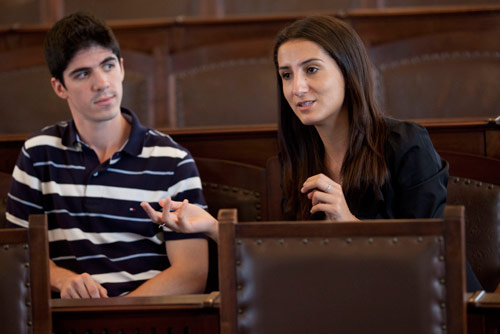
On a pleasant Thursday morning (March 24), I joined about a dozen fellow students in a conversation with Harvard President Drew Faust at a reception at the Faculty of Medicine, University of São Paulo (FMUSP). The gathering brought together students from the medical school (FMUSP) and the engineering school, who have been involved in collaborative international projects between the University of São Paulo and Harvard University. It was an informal conversation, with students introducing themselves and then briefly discussing their Harvard experiences.
Students from FMUSP spent a year performing medical research at Beth Israel Deaconess Medical Center and Harvard School of Public Health, mainly on the cardiac and pulmonary effects of air pollution. We also participated in a didactic program in Harvard’s Longwood Medical Area, attending conferences, lectures, and seminars at Harvard Medical School-affiliated hospitals.
Meanwhile, engineering students from Polytechnic School of the University of São Paulo participated in a two-week summer program on engineering and the environment, with a selected group of students — half from Harvard and half from Brazil. Together they attended lectures and discussions led by professors from both universities, and participated in site visits in São Paulo and Rio de Janeiro. This initiative happened for the first time in 2010, with a second session this year. Both were very highly rated by the students of both countries.
We shared our experiences on these amazing international collaborations — what we learned from them, how they changed our ways of thinking, how we navigated through the difficulties we encountered, and the differences we found in the learning and research processes in both countries. We also discussed the relationship between students and professors in both countries and many other cultural aspects of the experience. Finally, we talked about having a new “Harvard experience” in our future.
It was a highly valued conversation among students. I have high hopes that the same is true for President Faust. We also hope to have contributed to reinforcing the value of the collaborations mentioned, as well as future collaborations between our universities.
— Natascha Silva Sandy, sixth-year student of Faculty of Medicine, University of São Paulo
Complementing contradictions
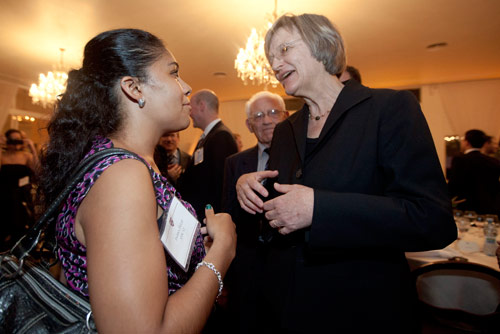
It was Jan. 22, six days before I was to embark on the plane that would take me to the experience that I had been dreaming — in fact, drooling — about since God knows when. I was desperately trying to finish up Larry Rohter’s “Brazil on the Rise: The Story of a Country Transformed.” This was partly because I had already gotten an overdue notice on the book, and partly because I thought that reading one book on Brazil would equip me with the weapons I needed to fight the battle that my study abroad experience would certainly challenge me with.
And it definitely has been a battle. They say that Brazil is the country of contradictions, and I have witnessed these colliding head-on in my time here. They have presented themselves both in more obvious forms — such as the backdrop of the favela-covered hills over the high-rise buildings on Avenida Paulista — and in more discreet forms. The latter manifestations have been the most enlightening. They emanate from the people who, although they hesitate to reveal the most basic details about their intimate home lives, will take you, a stranger, under their wing in a heartbeat. You quickly move from the cobbled streets and buildings made of crumbling cement into, ironically and charmingly, modern furnished residences.
Then there is the Brazilian spirit, both self-chastising and refreshingly optimistic. While I curse to myself over the immense puddles of rain that I have to wade through to get home, my fellow pedestrians laugh and splash in them.
So my experience in Brazil has been a battle for me. Not only must I attempt to make sense of the contradictions around me, but I must reconcile the values that I brought with me on that plane with the ones that are beginning to permeate every aspect of my life. However, there has been one thing that has encouraged me to believe that I will emerge as victor from this battle. This was the visit of Harvard President Drew Faust to Brazil on March 23.
Listening intently to her speech about Harvard’s exchange of knowledge and ideas with the world, including Brazil, and sitting in a room with many accomplished members of the Harvard community, I was filled with an overwhelming sense of understanding and, frankly, relief. For the first time since I’ve been here, my two worlds were coexisting, and I did not feel an ounce of discomfort or uncertainty. That is when I realized that immersing yourself in an environment whose values, beliefs, and spirit is foreign (in all senses of the word) to yours does not necessarily imply a need for reconciliation. Rather, they should compliment each other.
— Jaissa Feliz ’12 is a Harvard undergraduate who attended the Harvard Alumni Association dinner on March 23.
The higher education connection
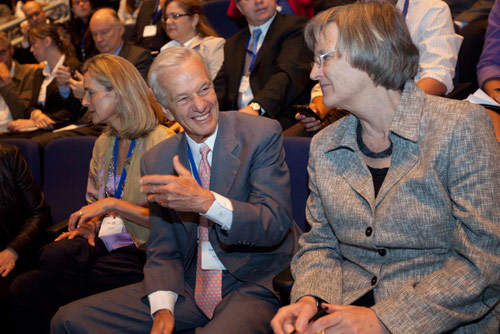
Harvard President Drew Faust started her first full day in Brazil on Wednesday (March 23) at a Fundação Estudar event in São Paulo, where she spoke to Harvard alumni, scholarship holders, members of the business community, and a group of prize winners in the national and international mathematics and science Olympiads.
Fundação Estudar is a Brazilian educational nonprofit that supports the formation of student leaders through scholarships.
Faust was introduced by Jorge Paulo Lemann ’61, Fundação Estudar’s founder and board member, who expressed his happiness at the growing relationship between Harvard and Brazil. Faust reciprocated by noting that in recent years two-way exchanges between Harvard and Brazil have notably intensified at the student and faculty levels, thanks to initiatives such as the local programs conducted by the Harvard Brazil Office and to the support of Brazilian students coming to Harvard with Lemann Fellowships and Fundação Estudar support.
Following on Faust’s remarks, Lemann shared stories of his Harvard experience and mentioned how the combination of excellence and high ethical standards he found at the University helped him to form some of the guiding principles of his business career.
Faust’s speech was followed by a panel discussion on the internationalization of Brazilian universities, featuring Universidade de São Paulo President João Grandino Rodas, Insper President Cláudio Haddad, and Harvard Vice Provost for International Affairs Jorge Dominguez, along with other presentations by Harvard alumni and faculty.
— Frederico Meinberg, M.P.A./International Development ’10, Harvard Kennedy School, and a Lemann Fellow from 2008 to 2010
Sampling Brazilian culture
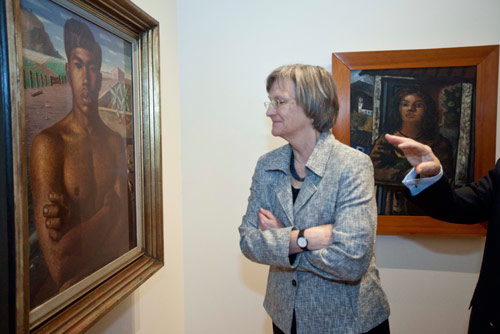
President Drew Faust took time during her first full day in São Paulo Wednesday (March 23) — following her morning speech at an academic conference that focused on higher education, Harvard, and Brazil, and before a series of meetings with alumni and friends of Harvard culminating in a dinner hosted by the Harvard Club of Brazil — to experience aspects of Brazilian culture.
She visited the Estação Pinacoteca, a former railroad station that served as a state police facility and jail decades ago. While there, she viewed a collection of significant 19th century portraits, landscapes, and still lifes, most of them by European artists living in Brazil or by Brazilian artists who had traveled to Europe.
She next visited the main building of the Pinacoteca de São Paulo, where curators guided her on a brief tour of major works from the museum’s collections. These included vivid scenes of rural life in the late 19th century by José Ferraz de Almeida Júnior, striking portraits of immigrants and slaves by Lasar Segall and others, and works of late 19th and 20th century Brazilian art.
Faust went on to sample some of São Paulo’s vivid sights, sounds, and smells in a walk through the city’s Mercado Municipal. There she tasted some of Brazil’s colorful native fruits, strolled (briskly) past stands filled with rows of salt cod and other seafood, and paused to discover that a Brazil nut never tastes so good as when eaten in the heart of Brazil.





